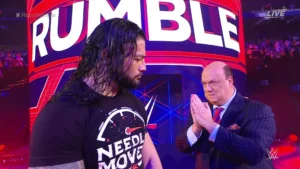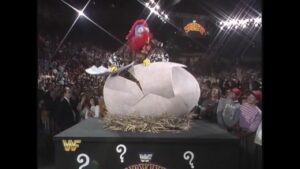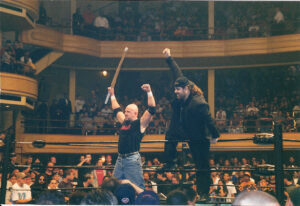History is written by the winners, according to the old cliche. But when it comes to wrestling history, the narrative you hear depends upon who you ask.
Tim Hornbaker’s Death of the Territories: Expansion, Betrayal and the War that Changed Pro Wrestling Forever, published in 2018 by ECW Press (no, not that ECW), is a great resource for anyone looking to better understand the modern history of the wrestling business, from its beginnings as a network of regional promotions to the current landscape, where multi-billion dollar companies air weekly shows on national cable networks.
To hear defenders of the old territory system tell it, local wrestling promotions, or “wrestling territories,” were like mom-and-pop operations, run out of town by wrestling’s equivalent to a big box store in the World Wrestling Federation, now WWE.
WWE’s Vince McMahon has been more dismissive, referring to the local promoters of old as, “little lords,” each in charge of their own fiefdom. All he did was refuse to play by their rules, and, when they couldn’t compete, they fell by the wayside.
As Hornbaker demonstrates, the truth lies somewhere in between these two versions of events.
Laying the Groundwork: AWA and NWA Dominated Wrestling Territories

Before McMahon stormed onto the scene in the early ’80s, wrestling was largely dominated by two main entities: the National Wrestling Alliance and the American Wrestling Association.
The NWA wasn’t one company but rather a network of local promotions, or “territories,” which, by way of their membership to the NWA, recognized the same world heavyweight champion. In exchange, those promotions got to swap talent with other NWA members and have stars like Harley Race, Dusty Rhodes, and Ric Flair visit their region and boost ticket sales. Also, NWA member promotions were protected from competition in their local region.
Promoters that did try to compete within an NWA member’s territory were deemed “outlaws,” and found themselves shunned by the rest of the NWA, which in those days, held most of the cards.
The other big presence on the scene was Verne Gagne’s American Wrestling Association, which happened to be a former NWA territory that had since struck out on its own. Based out of Minneapolis, the AWA was where the likes of Hulk Hogan, Curt Hennig, the Road Warriors, and many others, first cut their teeth before becoming stars on a larger stage.
The industry operated like this for years before two coinciding events transformed wrestling as we knew it, forever.
Cable Television Permanently Alters the Wrestling Landscape

The first of these events was the rise of cable television. Wrestling promoters had relied on local TV for years, but with cable, they were airing their shows in other promoters’ markets. Fans in one part of the country could now watch wrestling programs beamed in from other parts of the country for the first time.
While this expansion into other territories via cable TV technically violated the handshake “non-compete” agreement amongst the promoters, there was little anyone could do about it. If one territory had a deal with a local TV outlet, which in turn was being broadcast by larger cable networks into another territory, that was out of their control, and it’s not hard to imagine that the promoters enjoyed the wider exposure that cable TV afforded.
But the second event — Vince McMahon’s purchasing of the WWF from his father, Vince Sr., was even more earth-shattering.
Unlike his father, Vince Jr. didn’t respect the old alliances of the territory system and, seeing the potential offered by cable TV, began expanding nationally.
He paid cable providers to run WWF programming and used the lure of national TV exposure to sign talents like Hulk Hogan and Roddy Piper away from the AWA and NWA. He then used those same stars to run live shows against their old territories in their own backyards. Whereas “Video Killed the Radio Star,” in this case, it did the opposite, birthing the WWF wrestling star by providing a national platform and making the industry’s biggest names into household ones.
If Vince McMahon was an “outlaw,” he wore that label as a badge of honor, and fearlessly took on his competition directly.
Vince McMahon Rises as Gamble of a Lifetime Pays Off

Hornbaker shows how McMahon’s national expansion was a huge gamble, paid for by running up massive debts. If his efforts had failed, the WWF would have collapsed and he would have been bankrupt.
But as the WWF’s popularity exploded, thanks in large part to Hulk Hogan’s mainstream appeal, and with the success of the first Wrestlemania on pay-per-view, the company became a cash cow the likes of which had never been seen before in wrestling history.
Some of McMahon’s competitors just wanted to run a wrestling company and weren’t prepared for the WWF onslaught.
But that’s not to say that all of the local promoters were sympathetic. As Hornbaker points out, a number of them were quick to abandon whatever loyalty they felt to the crumbling NWA and began pushing their own national ambitions, albeit with much less success.
In McMahon’s world, only the strong survive, and he was determined to be the strongest. He saw before anyone else that the rise of cable television was already making the old territory system obsolete, as promoters could increasingly show their product in other promoters’ wrestling territories.
Not only did McMahon see this before anyone else, but he was also willing to act on it, and he didn’t care how many enemies he made along the way.
Death of the Territories does an excellent job of telling this story. It’s a must-read for any wrestling fan who wants to learn about the personalities and shake-ups that shaped the wrestling industry into what it is today.
Stay tuned to the Last Word on Pro Wrestling for more on this and other stories from around the world of wrestling, as they develop. You can always count on LWOPW to be on top of the major news in the wrestling world, as well as to provide you with analysis, previews, videos, interviews, and editorials on the wrestling world. WWE fan? You can check out an almost unlimited array of WWE content on the WWE Network.
Looking to talk wrestling, pro football, or any number of sports? Head on over to the LWOS Boards to engage in conversation with fellow fans!






